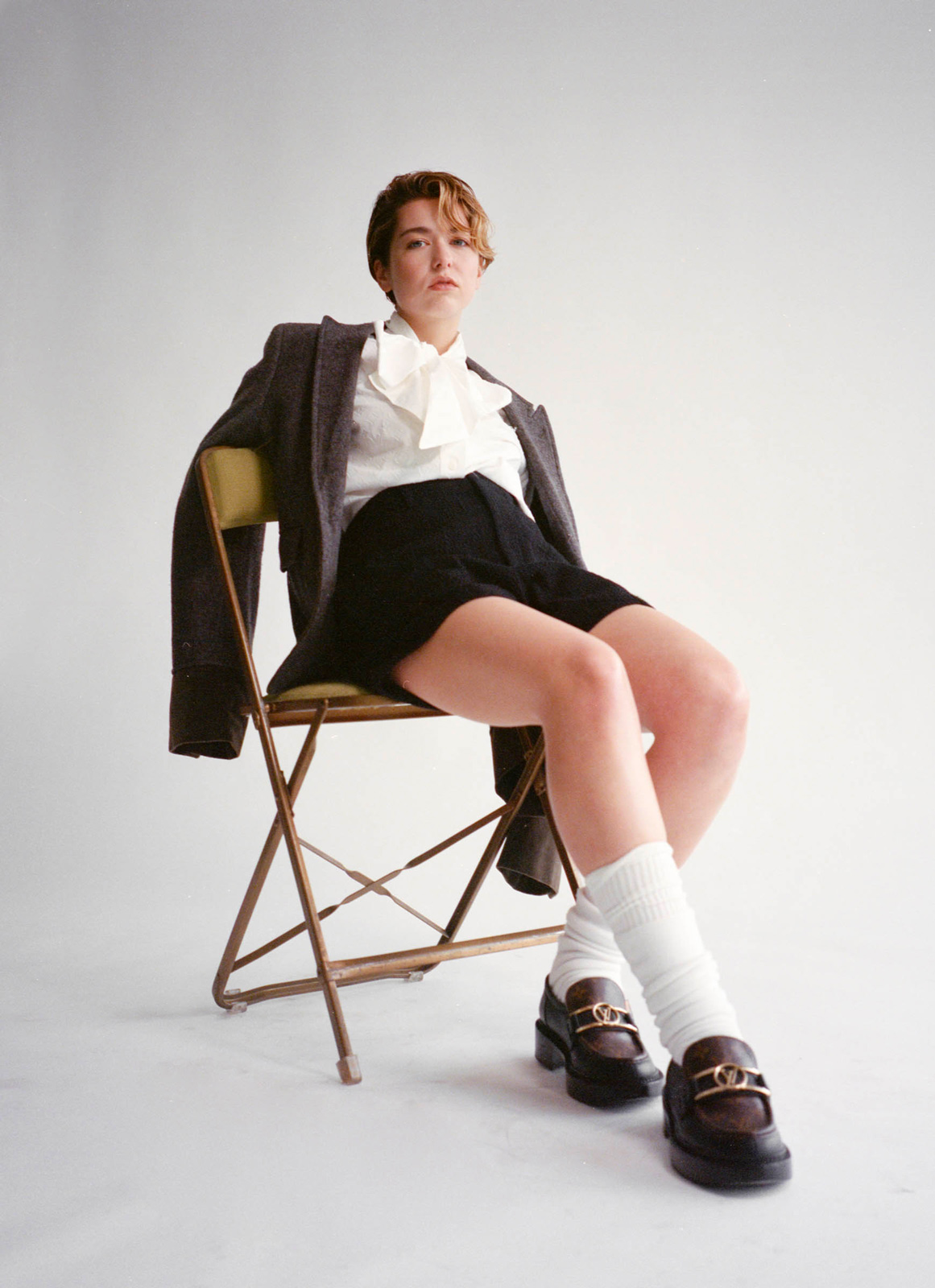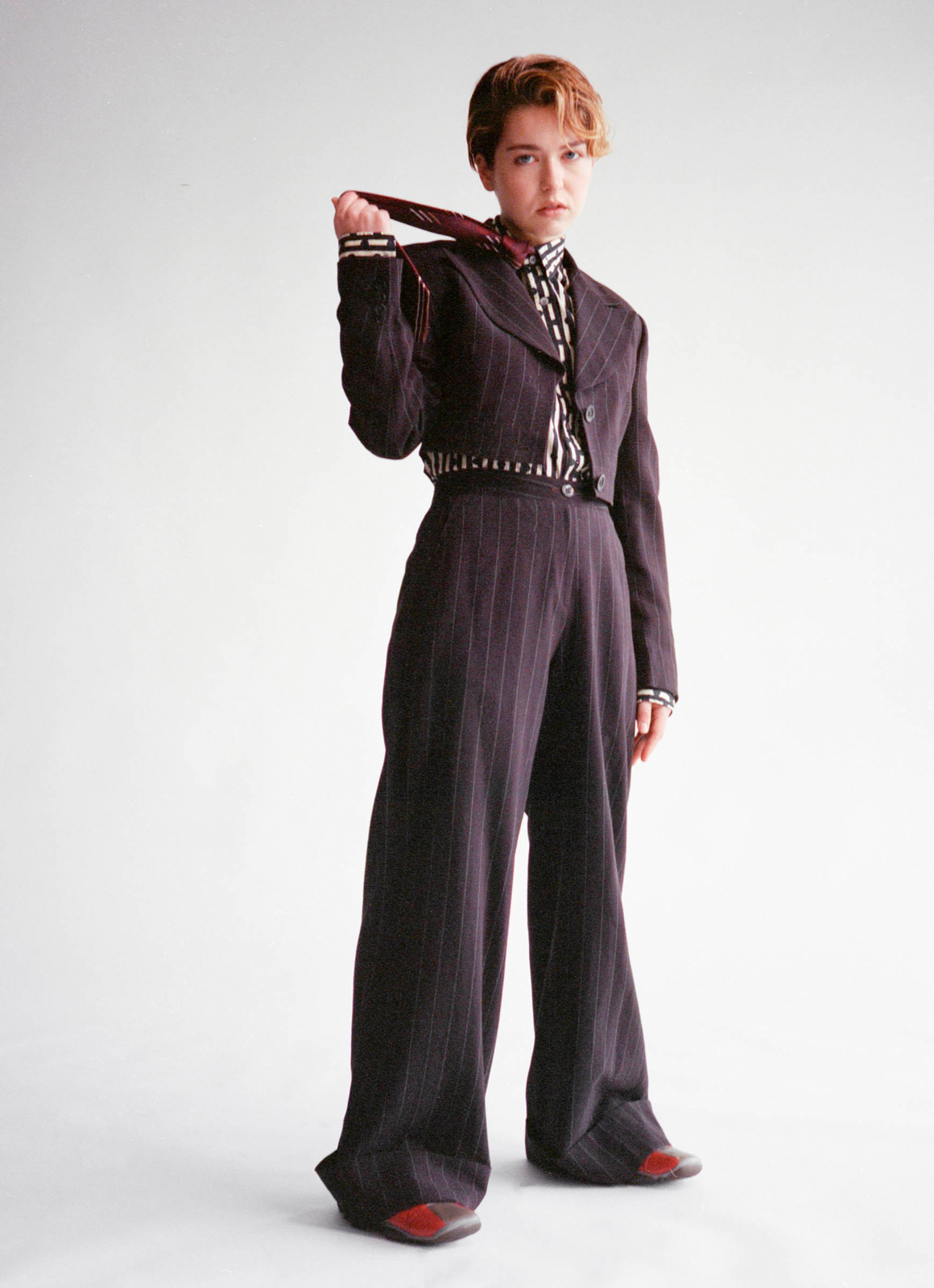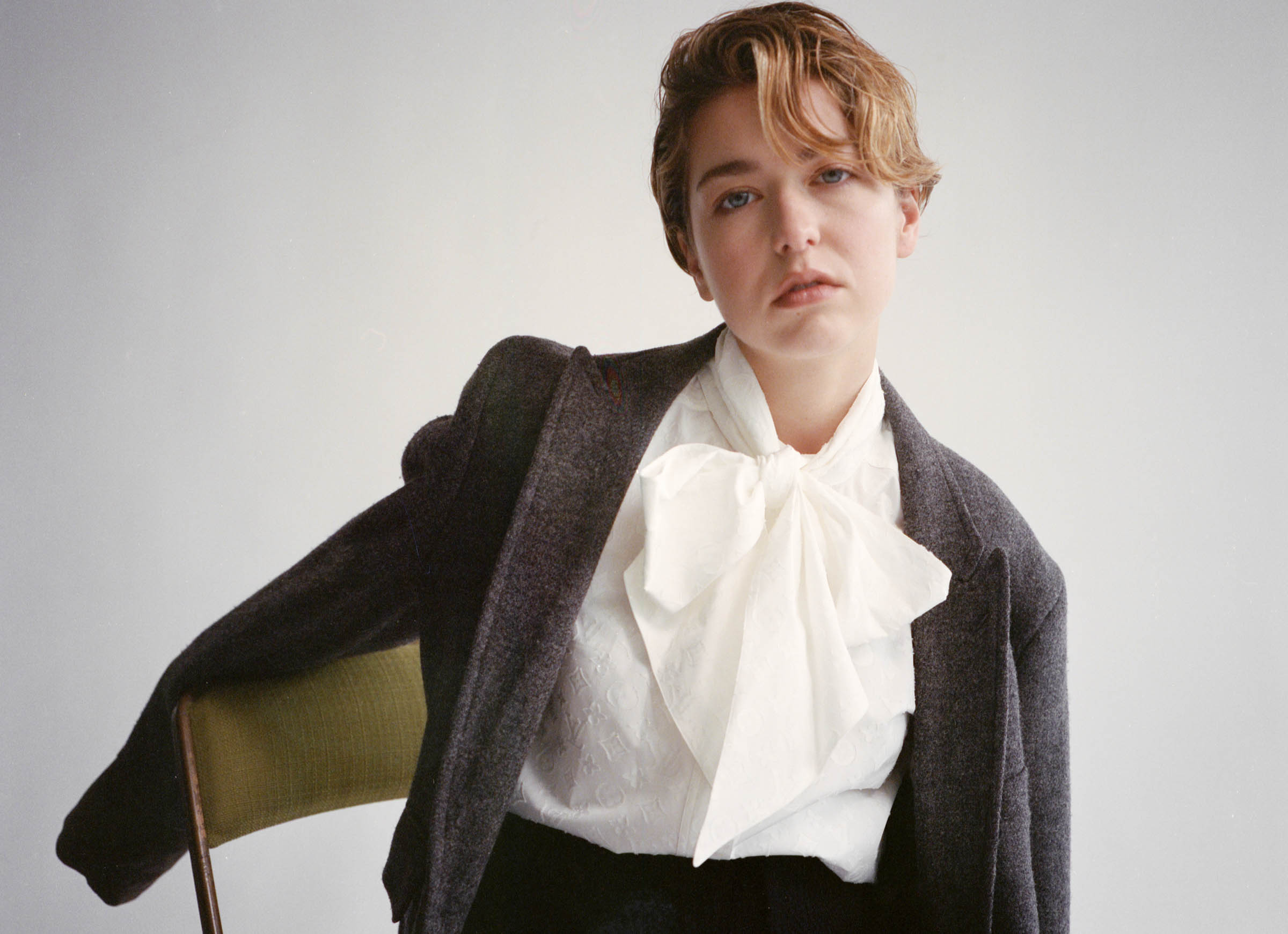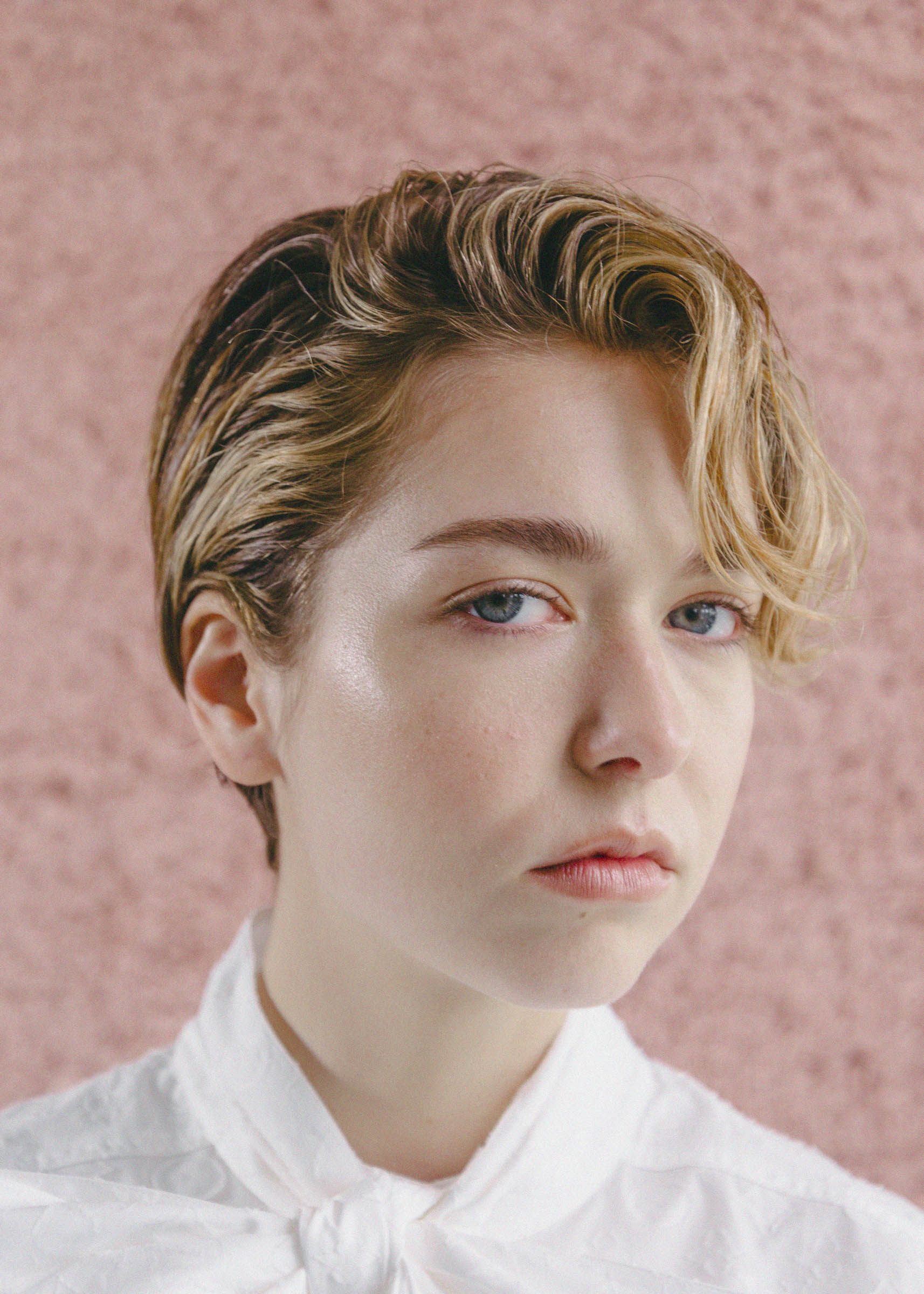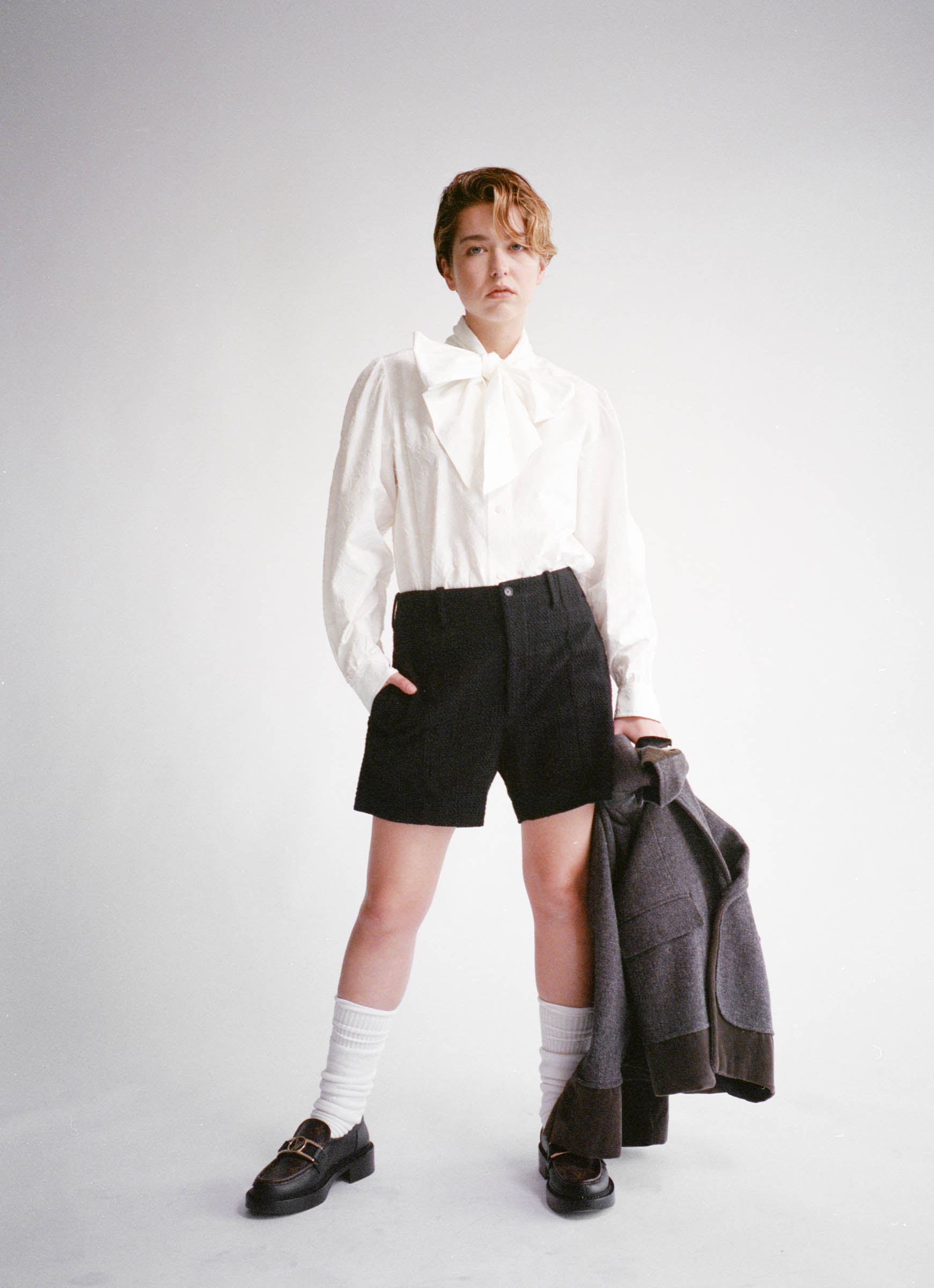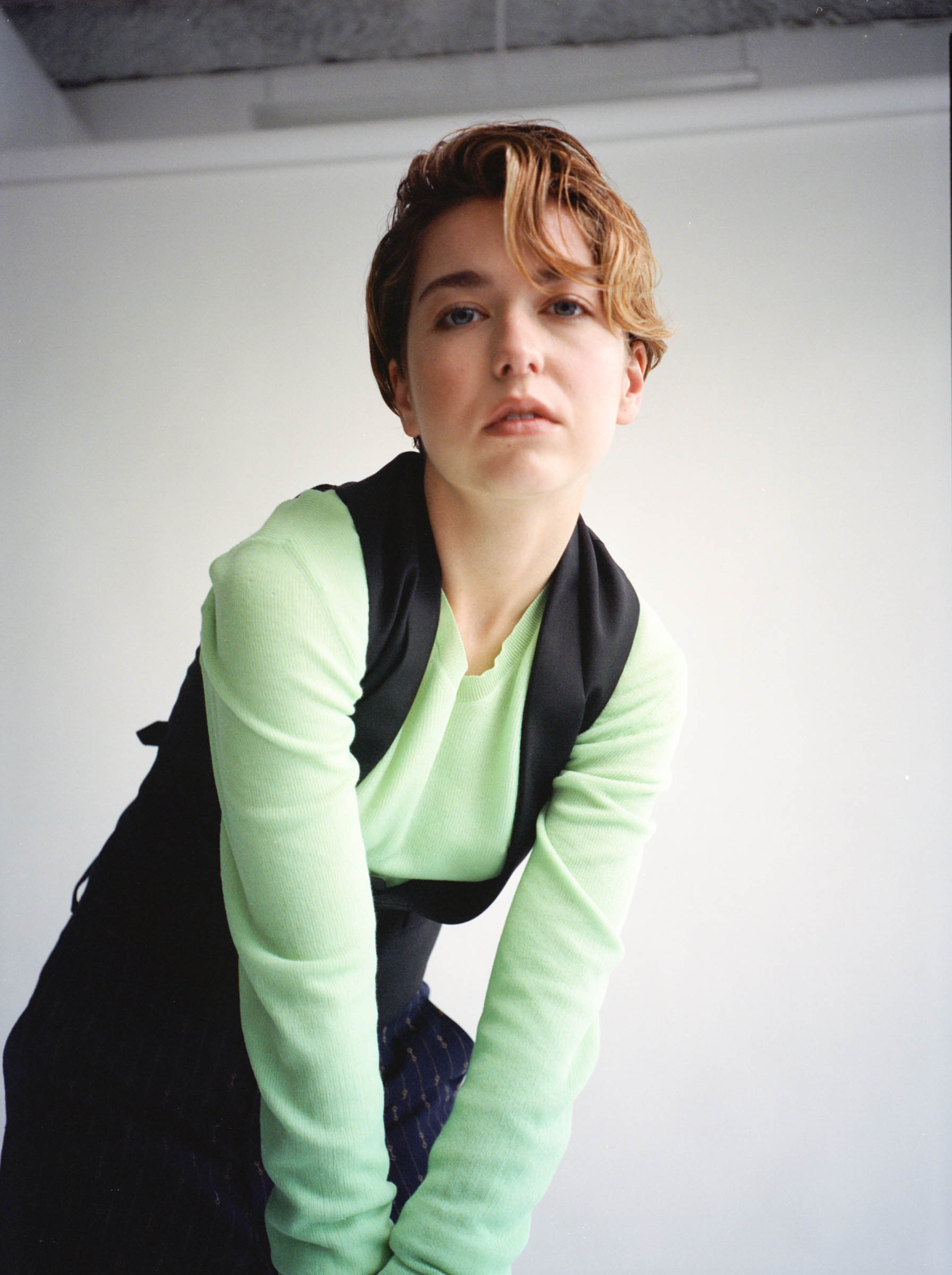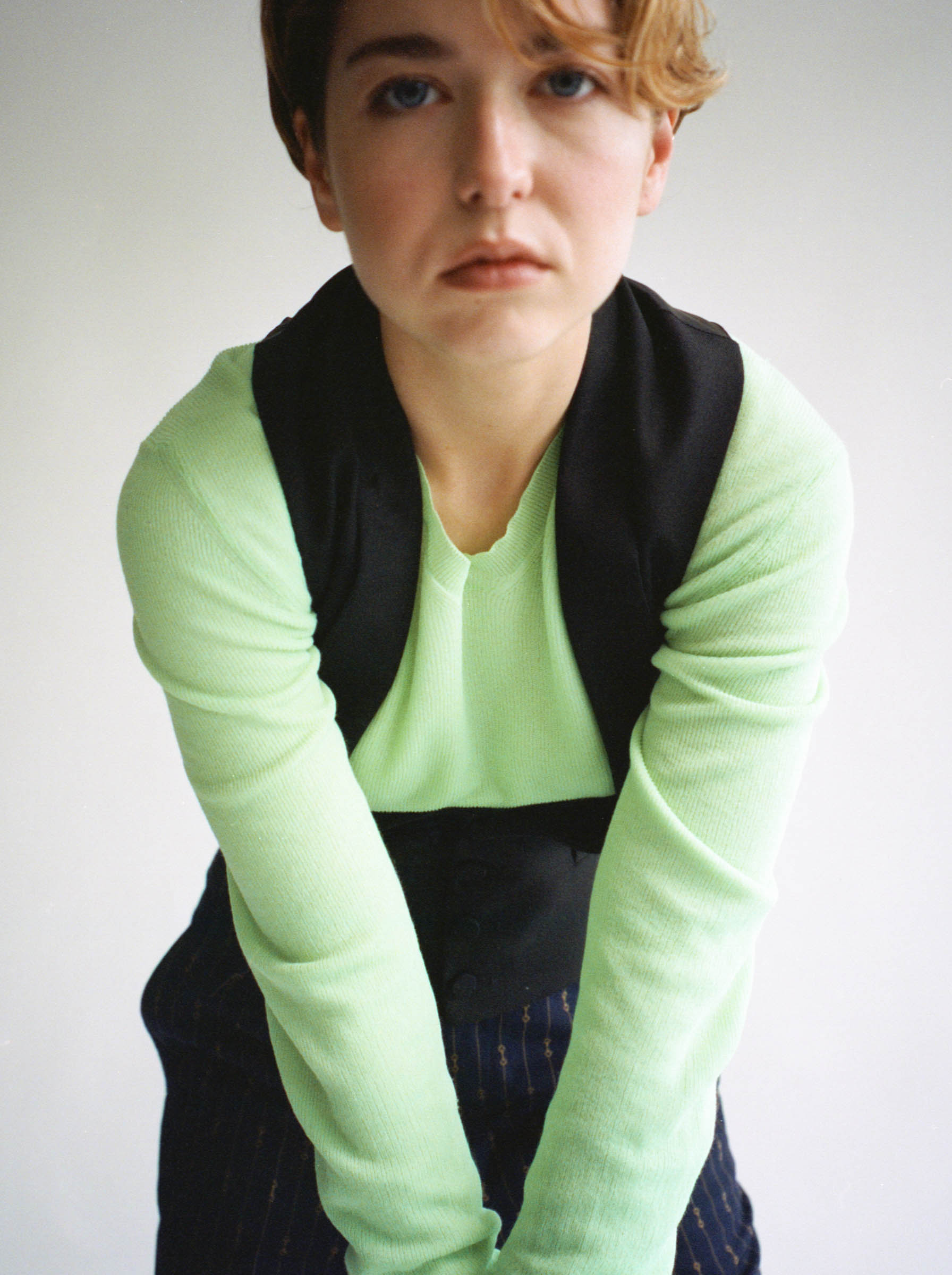Frontwoman Lindsey Jordan joins Document to discuss her changing perspective on love, the intimacy of songwriting, and her cinematic debut in A24's upcoming horror film ‘I Saw the TV Glow’
“I think songs need time to breathe, and you need to be inspired,” says singer-songwriter Lindsey Jordan, better-known as Snail Mail. “I try to make sure that any time I’m working on music, my head is clear. I have to get really in touch with my intuition; my instincts are the ones that created this project, and I don’t really want to know anybody’s opinion ’til I’m done.”
This distance between herself and outside influences is just one of the countless boundaries Jordan has learned to set, having skyrocketed into the public eye with the release of her critically-acclaimed debut album Lush (2018)—an intimate reckoning with queer desire and adolescent melancholia, written during Jordan’s own high school years. “We can be anything / even apart,” she sings in “Pristine,” chronicling the infinite possibility of early love, and the bittersweet reality of letting go; elsewhere on the album, Jordan captures longing and uncertainty, the rush of infatuation, and the sting of rejection. But while Jordan’s earlier work might serve as a testament to romantic potential, her heart-wrenching sophomore album sees her exchange the rose-tinted fantasy of romance for the gritty, messy reality. “I had no idea what I was talking about, going into the relationship that I’m talking about on Valentine,” she says over Zoom, explaining that Lush centered on unrequited love and crushes—“these small brushes [I’d had] with love,” versus her 2021 album, which was written in the aftermath of her first heartbreak. “For me, early love was all about idealization and just being like, ‘It doesn’t matter how this person acts, as long as I am in love with them.’ Then growing up and being in more adult relationships, you realize that sure, you could put yourself in that situation; you could also literally just lie in the road. But should you?”
These days, Jordan is more often on the road than lying in it. She just returned from a headlining tour in the US, and is about to embark on another in the company of fellow Baltimore acts Turnstile and JPEGMAFIA. Touring is exhausting, she admits, but playing live is also how her career originated: Before Lush and her six-song EP Habit (2016), she’d been debuting songs on the indie circuit, allowing them to evolve naturally in rooms full of people who didn’t know her name. “By the time we recorded [Lush], it just had a natural magic to it,” she recalls. The communal spirit of performing the songs together helped keep Jordan out of her head; “I just don’t like the idea of being vulnerable [in the studio],” she confesses. “Like, trying out lyrics around other people and stuff. Maybe I shouldn’t, but I find it embarrassing!”
For Jordan, vulnerability has always been a double-edged sword: Her talent for incisive, emotive songwriting paved the path to her meteoric rise—yet with this success comes the necessity for new personal boundaries, especially with her rapidly growing, often parasocial fanbase. “It’s hard to put yourself out there enough to release a record that feels honest—where you feel comfortable letting people have opinions about it,” she says. “On the internet, it’s always like, ‘I fucking hate her’ or ‘Oh my God, I love her… I want to kill her because I love her so much.’ As an artist, I’m not here to be a polarizing figure, or controversial in the same way that a politician would be; I don’t know why it’s so divisive.”
Nowadays, Jordan doesn’t read the comments; most of the time, she stays offline, in true Snail Mail fashion. “I try to remind myself that I’m making this song because I have these feelings, and I want to improve as a songwriter,” she explains, describing the way that coming to terms with her own early success has largely meant eschewing the fluctuating validation it supplies.
Music isn’t her only artistic vocation; Jordan’s also been working on her first cinematic project, the upcoming A24 horror film I Saw the TV Glow, which sees her in a starring role alongside the likes of Fred Durst and Phoebe Bridgers. “The entire experience was a dream for me, since I’ve always been such a huge movie person,” she says, describing days spent on Reddit, reading users’ analysis of random movies. Her other hobbies, like reading and playing video games, also provide a portal into another narrative landscape—one that allows her to switch modes, while still engaging with something beyond the endless scroll of social media. “When I’m home, I try to cram as much fun stuff in as possible—I’m almost militant about it,” she says.
To stay grounded, Jordan has chosen to surround herself with people who have loved and accepted her from the beginning—mostly friends from high school, and people she’s known since before she rose to fame. “My girlfriend, when I met her, she hadn’t heard of Snail Mail—when I heard that, I was like, We’re gonna be together,” she laughs. “You just have to be like, ‘Okay, these are my values. These are my friends. This is what I care about. And this is what I want to get out of my art.’ I try to keep in mind that you can’t find yourself based on people admiring you.”
Camille Sojit Pejcha: A lot of your work deals with desire and romance. I’m curious, how has your concept of love changed over the years?
Lindsey Jordan: I grew up with parents who are still together and in love, and it definitely rubs off on you. My dad is a total romantic: He brings my mom flowers all the time, and I’ve always grown up taking it in like a sponge. But there was also an element of fantasy about it. I had no idea what I was talking about, going into the relationship that I’m talking about on Valentine. For me, early love was all about idealization and just being like, ‘It doesn’t matter how this person acts, as long as I am in love with them.’ Growing up and being in more adult relationships, you realize that sure, you could put yourself in that situation; you could also literally just lie in the road. But should you? There’s so much that goes into relationships, on both ends, and you have to learn to put yourself into the equation.
Lush was really all about unrequited love and crushes—these small brushes that I’d had with love. And then Valentine was written right after I got my heart shattered. It’s really brutal when you wake up from your childish fantasy about what love is. But it’s amazing too, because it opens up space for what you need and the ability to have a real relationship.
Camille: I’m curious what your process was like going into this sophomore album, versus Lush. What’s the hardest part of the creative process for you? Has that changed over time?
Lindsey: Making Lush wasn’t easy, but comparatively it kind of was. I was in high school when I was writing a lot of it, and we were on a DIY circuit, playing shows all the time for people who didn’t know what Snail Mail was—and wouldn’t, like, take a video and put it on YouTube. And all the songs on Lush, we’d been playing for a year on tour before we recorded them. Which was fucking cool because we got to practice them as a band. I would have the song and bring it to the band, we’d jam and then play it on tour and it would evolve. By the time we recorded it in the studio, it just had a natural magic to it, because we’d been playing it live so much.
After a few tours, I was feeling really burned out, and at one point I was like, ‘I can never be creative again.’ And then when the pandemic happened, it was kind of cool creatively. I was like, time is slowing down and I have the grace to sort of work longer: to write a little and take a break, look at what I’ve done, work on it some more, take a break. Because I think songs need time to breathe, and you need to be inspired. You need time to reflect. You’re feeling yourself writing some lyrics… And then a couple of weeks later, that’s when you know if it’s cringe.
The other thing about Valentine is, it was all me making these demos and fleshing them out with my mini log keyboard and my guitar. Then I brought them into a studio to record, switched producers a couple times, and eventually, it all came together. It was the same bassist and drummer that have always been in the band, but it wasn’t the same as practicing with the live band—it was a lot more ‘me, me, me, me, me,’ and then you guys come in and record your part. It was interesting, but I don’t know if I would do it that way again, because I kind of liked the magic that is me, Ray [Brown], and Alex [Bass] jamming together.
“It’s really brutal when you wake up from your childish fantasy about what love is. But it’s amazing too, because it opens up space for what you need and the ability to have a real relationship.”
Camille: How does solitude factor into your creative process? I imagine you don’t get a lot of that during an album cycle.
Lindsey: I’m a solitude addict. Maybe it’s just because my life is spent around so many people—on tour, the only time I get to be alone is in my hotel at the end of the night. During the pandemic, something switched: Before, I was a lot more social, and now I feel completely different. My whole life is solitude vibes when I’m not working.
And I really prefer to work, cook, and do things by myself. So when I have to be in a studio and the producer wants to workshop together, I’m like, sorry. I don’t like the idea of being vulnerable—like, trying out lyrics around other people and stuff. Maybe I shouldn’t, but I find it embarrassing! I have to get really in touch with my intuition; my instincts are the ones that created this project, and I don’t really want to know anybody’s opinion ’til I’m done.
Camille: It makes sense that having others around would subconsciously influence you. Between projects, what do you do to recharge and reconnect with yourself?
Lindsey: It’s really hard, but I feel it’s kind of important to at least try to be intentional about relaxing. So when I’m not on tour, I get a lot of reading in. I cook a lot—I like to cook for my girlfriend. I also love movies, so I’m constantly trying to delve deeper into that universe. I spend just fuck tons of time on Reddit, reading people’s analysis of movies. I like to play video games, and that feels like the only hobby where I’m really and truly free, because I’ll just sit there all day long.
Camille: What are you reading these days?
Lindsey: I’m going through this crazy Dennis Cooper phase. I’m reading this book The Sluts. It’s pretty subversive and gay. It’s about a lot of underground gay men, and kink stuff. It’s really, really juicy. And a lot of the same stories and characters intertwine, but in different contexts.
I’ve also been really into Bret Easton Ellis lately. I somehow was able to get a ton of reading done on the last tour, just trying to do something while we’re driving, but usually it’s hard. When I’m home, I try to cram as much fun stuff in as possible—I’m almost militant about it. You just start to go crazy if you don’t force yourself to, but it’s also kind of hard to relax.
For me, it’s about forcing myself to chill without zoning out. I think I could spend an entire day looking at TikTok. The algorithm is so smart that you’re actually smiling and laughing and genuinely having a good time, unlike a lot of social media platforms, but it sucks your time, and it does feel awful afterwards. You get that post-TikTok clarity [both laugh.]
Camille: The name Snail Mail is obviously a reference to a simpler time, or at least more analog form of communication. I’m curious about your relationship with the internet; how do you navigate the increasing exposure of social media and our ‘extremely online’ era, as someone who so suddenly became a figure in the public eye?
Lindsey: I struggle with it. I almost never have Instagram on my phone. It’s hard to put yourself out there enough to release a record that feels honest—where you feel comfortable letting people have opinions about it. And then there’s playing shows, when you’re putting yourself out there and everybody in the crowd has an opinion about it. But no matter what, you’re just doing your best. At the end of the day, I don’t really understand why we should have a world where people can share their opinions on things directly to the person making them. It’s not healthy. I’m an artist; I make art. On the internet, it’s always like, ‘I fucking hate her’ or ‘Oh my God, I love her… I want to kill her because I love her so much.’ [As an artist] I’m not here to be a polarizing figure, or controversial in the same way that a politician would be; I don’t know why it’s so divisive. I’m just like, Fuck, I really just want to make music, and I want to be a part of the internet—like, I’m Gen Z, you know, I love to scroll—but for the most part, posting gives me anxiety. I can’t read the comments. I’m scared if I look at my explore page and see something mean about myself, I’m very guarded about it.
With Instagram, I of course have a secret one where I can have friends and a personal life on there. Otherwise, I use it as a utility, to get the word out about tours and stuff. I do think that there are people out there who have figured out how to put space between themselves and Instagram and still use it, but I don’t think that’s me.
Camille: You mentioned you’ve come to terms with the experience of putting your own music out in the world, along with the emotional vulnerability of performing. Are there any emotional boundaries you’ve put in place along the way that have changed how you think about it?
Lindsey: My original interpretation of how everything was, ‘I’m just gonna be myself, and put myself out there.’ I was going to all these stupid fucking label parties and being like, ‘This is so fun, they want to get to know me.’ Then you start to see how everything actually is, and realize you have to stop getting high on your own supply, because if you genuinely are drinking the Kool-Aid, you’re gonna come out of it really tired and burnt out and your music’s gonna suck. The only way that I’ve been able to, like, not have a breakdown once a week is by setting a boundary: I have the music life, and then I have my life. Like, all my friends clown on me all the time. Nobody is a ‘fan,’ it’s just kind of like, they’ve all known me since before I started doing music. A lot of my close friends are people who I knew from school and stuff, who all now live in New York. My girlfriend, when I met her, she hadn’t heard of Snail Mail—when I heard that, I was like, We’re gonna be together.
My relationship with them, and my hobbies, are separate from music. I try to keep in mind that you can’t find yourself based on people admiring you. You just have to be like, ‘Okay, these are my values. These are my friends. This is what I care about. And this is what I want to get out of my art.’
So I try not to read the comments. I try to make sure that any time I’m working on music, my head is clear, and I’m making this song because I have these feelings, and I want to improve as a songwriter. I want to focus on songwriting, and the best thing you can do for yourself is to understand that everything else, it’s silly. It’s really easy to just get weighed down with all of the dumb shit.
“The hardest part [of acting] for me was stepping into something I didn’t know how to do, and going easy on myself that I haven’t perfected it in any way, shape, or form.”
Camille: It was recently announced that you’ll be appearing in A24’s I Saw the TV Glow. How was the experience of acting in your first film?
Lindsey: I’ve always been a huge movie person, so the entire experience was a dream for me; I loved watching all the moving parts work together, getting to know everyone in the cast and crew, learning about the process, watching the actors work… It was love at first read for me when I got the script, so I was really enthusiastic about the project and trying to nail the audition. I kept my hopes low, and getting the part gave me kid-on-Christmas-morning level bliss. I was actually jumping around.
The cast was also overwhelmingly talented! I was in awe of all of the professionals everywhere; Helena Howard’s acting is next level and insane to witness, the hair and makeup and special effects… I could go on forever. I was on tour in Europe, constantly surrounded by my bandmates while I was learning and rehearsing my lines, so I ended up learning them by writing them down in my notebook over and over until every word was burned into my brain.
Camille: What was the most challenging part?
Lindsey: The hardest part for me was stepping into something I didn’t know how to do, and going easy on myself that I haven’t perfected it in any way, shape, or form. I tend to be hard on myself, so I had to force myself to accept the possibility of being embarrassed or not being good at first.
Camille: Did anything particularly surprise you about the process of acting with other people, versus working independently as a musician?
Lindsey: I was surprised by how much more natural it felt to do serious scenes with the other actors, versus the more campy scenes and monologues. I thought it’d be awkward being face-to-face with another actor, doing a serious dialogue and trying to make it believable, but it was actually much easier to get into it when I was able to channel real emotional experiences and transport myself into the scene with someone else.
Camille: Outside of your creative work, what makes you feel most like yourself these days?
Lindsey: That’s a good question, and a hard question. I’m in this period of my life, where I had all this time off after so much happened, and now I’m touring and feel like a completely different person.
I feel like myself when I force myself to go out and see friends; I usually leave being like, ‘That was so nice. I’m so glad I did that.’ I feel in touch with myself then. It’s the same with forcing myself to do hobbies. I feel like myself after I watch a movie that really does something for me, just to feel something. It’s the same with reading, just having a book that I’m really into where I’m, like, picturing the world. I feel like that is a semblance of myself that I recognize.
Hair Akira Yamada. Make-up Chloe Grae. Stylist Assistant Jenny Assaf.



